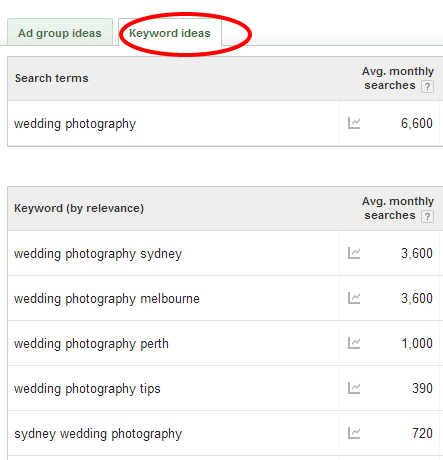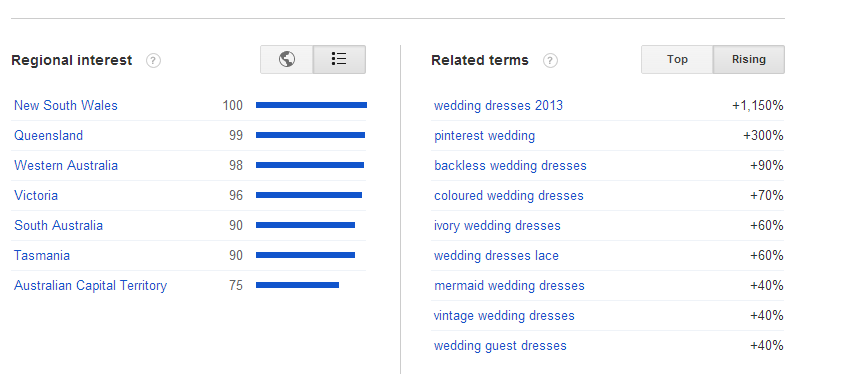Keywords are crucial when it comes to online searching. They play a pivotal role in helping search engines find your content (and, consequently, your website) amongst all the other words and the estimated 4.12 billion pages on the Internet.
So, whatever niche you operate in, you should ensure your site is peppered with these keywords, which are the words people would naturally use when searching for your type of product or service.
Don’t worry, you don’t have to ‘guess’ what the keywords for your industry are. The image below is just one example of the many useful (and free) tools you can use to help you find keywords for your business niche.

So, tell me more about keywords
Keywords help explain what a particular site, page or content piece is about.
They can be single words (often called seed words) or they can be some combination of words, also known as keyword phrases.
Let’s consider a practical application of keywords.
If, for example, you’re a wedding photographer, the following seed words and keyword phrases would be crucial to your business:
- Wedding (seed word)
- Photography (seed word)
- Wedding photography (keyword phrase)
Why? Because they’re the kind of terms someone looking for your service would, logically, use to find a business providing that service, right?
So, your aim would be to ensure these words and phrases appeared on your website as often and as naturally as possible. That way, the search engines would be able to read your site and see that it contains lots of references to ‘weddings’ and ‘photography’ and ‘wedding photography’ and, therefore, must be about those terms.
Next time someone searches for those terms, the search engine looks at its index for sites containing those terms and, in theory, your site will pop up in its list.
It’s ‘in theory’ because these are just the basics. There are other methods for appearing higher in the rankings, but that’s for another article.
A keyword phrase is more specific and provides a clearer understanding of a topic. Seed words are broader and can cover many topics.
For example, the word ‘wedding, can be associated with many niches within the wedding industry, be it wedding venue, a wedding cake, a wedding dress etc.
Similarly, photography, too, can be associated with many categories, such as fashion photography, action photography, underwater photography and so on.
So, two seed words together make a keyword phrase and are more specific, allowing your search engine to provide more refined results to searchers.
Keyword phrases that have three or more words are often referred to as ‘long-tail’ keywords. A good example of a long-tail keyword would be ‘wedding photographer Sydney’ or ‘wedding venue Brisbane’.
Long-tail keywords usually attract more targeted visitors than broader keywords.
Benefits of keywords
Clearly, keywords help drive traffic to your business’ web page, but by learning more about keywords that are specific to your niche or geographic location, you can get even more targeted traffic.
Building on the example above, if you’re, say, a Perth-based wedding photographer and someone types in ‘wedding photographer’, Google will return 130,000,000 pages containing those words or unique instances of the keywords. However, simply by adding the word Perth to your keyword list, that number falls to 326,000.
You have a lot more chance of being found in a crowd of 326,000.
Besides, the people who have typed in the phrase ‘wedding photographer Perth’ are specifically looking for a wedding photographer in Perth rather than just being someone who is searching generically for the phrase ‘wedding photographer’.
You may still be found via their search, but it’s useless if you’re found by a bride in Brazil or Barcelona, or even Brisbane.
The correct use of keywords on your website helps you to attract targeted visitors. Keywords also help people to quickly understand what a page is about and that makes for a better user experience.
So, how can I find my keywords?
To a certain extent you can guess what keywords are relevant to your niche.
However, different people will search for the same things using different words and phrases. For example, one bride may type ‘wedding dress’ into a search engine, while another may type ‘wedding gown’.
Rather than simply guessing what people could type into a search engine, you can use a range of free tools that show you what words people tend to use when looking for your type of service or product.
The latest offering from Google is called Keyword Planner. It used to be called Keyword Tool.
Below is a screenshot of keyword planner in action. It shows keyword ideas for the phrase ‘wedding photography’ targeted to the Australian market. It also shows the number of monthly searches for a particular phrase.

Two other useful places to find keywords for your own business is the websites of your competitors’ websites and Google Trends.
Competing pages that rank high in search results for your keywords will show you how to use your keywords as the fact they already rank higher than you is an indication that they are using the same keywords reasonably well.
Google Trends offers virtually real-time information related to regional searches as well as keywords that are rising in popularity.
Let’s do a quick example for ‘wedding dresses’ using Google Trends.
The screen shot below illustrates the results for Australia for the past 12 months

As you can see the phrase is used most by searchers in NSW, then Queensland, then Western Australia etc. Similarly, the keyword phrase ‘wedding dresses 2013’ has been the most popular and, as such, that’s the phrase someone who sells or designs wedding dresses would want to include on their website.
How and where to use keywords
Content is king. Remember that.
Keywords only work if they have content to go with, so wherever you create content you should ensure the appropriate keywords are used.
Content comes in many flavours and includes web pages, video channels, press releases and blog posts.
However, you want to ensure that the keywords also feature in the unseen parts of each web page. These parts include title tag, header tags, meta descriptions, image descriptions, file names, URLs and anchor text.
Well discuss these things in future editions of Easy Weddings’ Pro-Education newsletters but, briefly, we can consider a page’s title.
Whether you have a web page, a blog post or a video, they all have titles. So you should ensure that title contains an appropriate keyword phrase.
For example
<title>Backless Wedding Dresses | The Australian Dress Company </title>
The above title clearly targets ‘backless wedding dresses’ and provides some branding for the dress company. It also targets an Australian audience.
This will work well, provided that the detailed content actually deals with backless wedding dresses. If it doesn’t, the search engines will pick up any illicit use of keywords, so be careful because the last thing you want is to be black banned.



